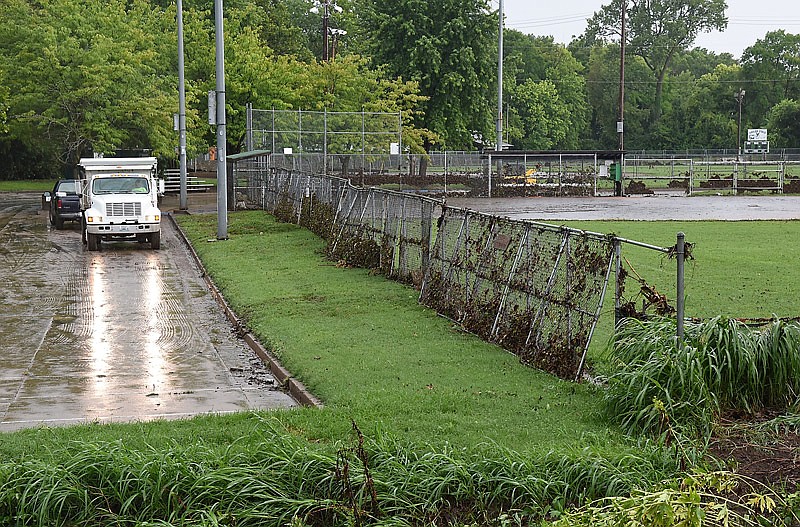A two-hour 4th Ward town hall gathering Saturday morning at the Capital West Event Center spawned at least two virtual certainties:
No. 1 - Residents devastated by the flash floods of August and September are unified in their support of a Jefferson City election in April to fund about $36 million in stormwater infrastructure improvements; and
No. 2 - Highly motivated, concerned residents announced they are organizing a coalition to advocate for the passage of the stormwater initiative and support other grassroots campaigns on the horizon.
The coalition, as yet unnamed, is being organized by flood victims Marilyn Russell and Eric Weddle. Russell, of Lynnwood Drive, said she had suffered $39,000 in damages directly related to the flash floods, as well as the costs of replacing a heating and cooling system. Maryann Reuter, another speaker at the Saturday forum, said her family's direct losses were at least $25,000.
Russell is in the driver's seat of the emerging coalition, which she described as an absolute necessity in keeping the City Council attuned to the expenses residents sustained and will sustain again because of a stormwater system those attending Saturday agreed was ill-prepared to protect against flash floods. Russell, Weddle and Reuter were disappointed Mayor Carrie Tergin, other council members and more of those harmed by the floods, were not at Saturday's meeting.
Jefferson City Public Works Director Matt Morasch was on his feet for more than 90 minutes discussing the past, present and future of the contentious stormwater issue, which has been top of mind since the destructive storms just weeks apart. The city's popular Washington Park Ice Arena sustained several hundred thousands of dollars of damage in the floods when the waters of Wears Creek cascaded over its banks. About two dozen residents peppered Morasch with polite but pointed questions and comments. Most took the occasion to thank Morasch, who manages a 100-employee workforce, for sacrificing his Saturday to hear their complaints.
Morasch had explained to the crowd his department had a complaint-based to-do list in house right now of some $15 million in stormwater projects that required attention-if only the city had the funds to address them. The major overhaul of the existing stormwater system, he said, was estimated to cost $36 million in 2016 dollars. He said the projects on the short-term list are not centered just in the 4th Ward but instead are scattered throughout Jefferson City.
Morasch reviewed the decade-old city analysis of stormwater improvements, which was shelved when a previous iteration of the City Council had determined its costs to be too rich for the taxpayers' pocketbooks. He also reported on the City Council's Oct. 24 work session, at which the stormwater crisis was the centerpiece of a night of personal testimonies, including some from a few of those residents at the Saturday morning town hall.
Significant elements of his presentation were pulled from the 2014 Stormwater Utility Survey produced by the international engineering firm Black & Veatch, of Overland Park. Seventy-eight municipalities responded to the study; 62 percent of those said they "did not have adequate funding to meet most of their utility needs." Only 12 percent said they had "integrated wet weather management plans to address water resources issues more comprehensively."
Fourth Ward Councilmen Carlos Graham and Glen Costales moderated the town hall, one of a series they have co-hosted. Residents, mostly from the 4th Ward, conveyed stories of personal loss but also a shared view the City Council and unelected officials should have taken action to prepare for deluges long before the terrible tandem of 2016 storms.
The councilmen and Morasch explained that, per a Missouri Supreme Court ruling, municipalities must ask for voter approval to fund major infrastructure projects, such as the stormwater question it is likely voters will be asked to answer in the April 4 election. Morasch's estimation is the local effort would require a user fee of $3.50 to $4 per month for the city's 14,000 owners of homes and parcels of land. Commercial structures would probably face a new bill of $300 a month or more if such an initiative passes, Morasch said.
Some average monthly single-family rates for stormwater user fees: Austin, Texas, $9.20; Topeka, Kansas, $4.25; Richmond, Virginia, $3.75; Arnold, $3; Overland Park, Kansas, $2; Columbia, $1.15; and St. Louis, $0.24. Seattle is at $26.58. No discounts are offered in 78 percent of the municipalities surveyed. Seventy-three percent of the fees are paid by property owners, and 73 percent receive their user fees with other utility bills.
Morasch, Costales and Graham promoted a series of three meetings scheduled in the coming weeks starring the stormwater issues: 11:30 a.m. Nov. 22, with representatives of the federal and state emergency management agencies; Dec. 6, with the City Council spotlighting options for placing the stormwater issue on the April ballot (language must be ready by Jan. 31); and 11:30 a.m. Dec. 8, with the Public Works Committee, including at least one councilman from each ward, examining the issue. All the meetings are at City Hall.

